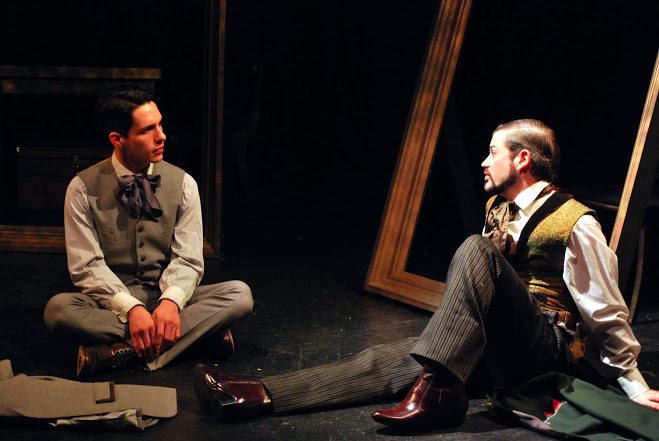

Review: The Picture of Dorian Gray
Critic: Tonianne Bellomo
Section: Off Off Broadway, Play Revival
Genre: Drama
Author: Oscar Wilde; Adapted and Directed by Glory Kadigan
Theater: The Workshop Theatre Mainstage
Dates: Runs through 4.14.13
No play or film production of The Picture of Dorian Gray has ever been able to capture its essence and beauty yet Glory Kadigan’s adaptation came close. Though at times it seemed to assume too much about the text, the play as a whole did a wonderful job at capturing the beauty of Oscar Wilde’s greatest work.
The artistic approach to the play was very well done. The one thing I was very worried about walking into this play was how were they going to successfully recreate the beauty that Wilde wrought. The company was successful because they didn’t try to. There were no flashy and garish backdrops or overly colorful lighting; they just had multiple large, and small, frames upon the stage against a black backdrop. The ensemble then would recite the text as they stood behind their respective portrait frames, demanding that the viewer imagine the world as he or she sees fit.
The frames they worked around were not your typical 11x14 portrait frames; they were human sized, maybe six foot by three to five feet frames that the ensemble slunk around the entire night. The effect was that at all times the ghost of the portrait was with the audience.
Another concern of mine was the portrait itself. The company, though, was clever- they never showed a portrait of Dorian, played by Francesco Andolfi. Instead, they either had the ensemble members facing each other on either side of the frames or, later on, having Dorian’s victims, bloodied and pale, represent his portrait. This take on the picture was one of my favorite aspects of the play; it showed a great understanding that it was not so much the aging that made Dorian horrified but how grotesque his sins had made him.
The casting was well done. Andolfi seemed at times too aloof to really play Dorian and didn’t seem to have the intensity the character had in the book but he managed to create the character arc that is so important to the text. He, over the course of the play, did adopt Lord Henry’s, played by David Stallings, mannerisms and mode of speaking. I thought this was a wonderful way to show just how much Lord Henry influenced Dorian and how Dorian changed from a naïve boy to a cruel man.
Basil Hallward, a character I have never been sympathetic to, was wonderfully cast. Eric Percival really made the audience pity the character and feel that he was just a lonely artist who loved Dorian, not just the idea of him. His shining moment was when Dorian showed him the portrait. He was able to bring to life the horror of that scene, even when just staring at an empty picture frame. For the first time since I’ve encountered this book, I actually felt for Basil and lamented his death.
The real star of this play, though, was Stallings. Though, at times, he could be too flamboyant, he really managed to become Lord Henry. He was charming and witty, full of life. His presence on the stage was larger than life, full of sarcasm and confidence. He commanded the audience’s attention, even when he was just an observer of events. His facial expressions were spot on and his swagger just screamed Lord Henry.
The one thing I wish Kadigan had done was cut down on the sexual content. I do not consider myself a prude but I feel that the whole charm and true brilliance of the book is that Wilde only hints at the darker, raunchier side of society. He paints it and colors it in a way that the reader isn’t so focused on the carnal but on the actual affect that the carnal had and who Dorian affected with his actions (which, once again, she showed brilliantly when she had Dorian’s victims represent the portrait). Had she just suggested the sexual content and the nudity, she would have gotten her idea across more clearly.
Still, overall, I do consider this a success. The actors captured their characters and I truly felt like I could see Wilde’s beautifully dark world come to life on the stage.